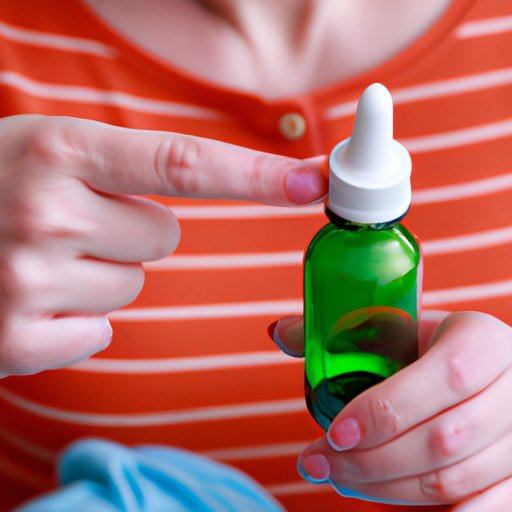
Introduction
Managing allergies while breastfeeding can be a challenging task for many mothers. While allergy medication can provide relief, nursing mothers often wonder if it is safe to take allergy medicine while breastfeeding. In this article, we will take an in-depth look at the safety of using allergy medicine when breastfeeding and provide tips on managing allergies safely and effectively as a nursing mother.
The Ultimate Guide to Allergy Medicine and Breastfeeding: What You Need to Know
Before diving into the specifics, it is essential first to understand what allergies are, how they may impact breastfeeding, and how allergy medications work. Allergies are an immune system response to a substance that is usually harmless, and common symptoms include sneezing, runny nose, and itchy eyes. These symptoms can be especially challenging to manage for nursing mothers because they can impact maternal-infant bonding and potentially compromise breastfeeding success.
Allergy medications work by targeting the underlying immune system response that leads to allergy symptoms, and there are several types of allergy medications available on the market. This guide will help nursing mothers navigate the varying medication options and determine the right course of action for managing their allergy symptoms safely and effectively.
Is It Safe to Take Allergy Medicine While Breastfeeding? The Answer Might Surprise You
There is a common misconception that allergy medication is not safe to use while breastfeeding, but this is usually not true. Research shows that many allergy medications are safe to use when breastfeeding, although it is critical to discuss any medication use with a healthcare provider before starting any medication.
Factors such as the type of medication, the dosage, and the timing of dosing can impact the safety of allergy medication for nursing mothers and babies. Uncontrolled allergies can have negative consequences on breastfeeding, but properly controlled allergy symptoms can lead to a better quality of life for both mother and baby.
Balancing Your Allergy Symptoms and Your Baby’s Health: Tips for Taking Allergy Medicine While Breastfeeding
Here are some tips for minimizing risks while taking allergy medication during breastfeeding:
- Choose antihistamines that are non-sedating to minimize the risk of drowsiness for both mother and baby.
- Use the lowest effective dose of medication to minimize infant exposure.
- Take the medication at a time when the baby is likely to feed infrequently to lessen the amount of medication the baby receives.
- Monitor symptoms and side effects closely.
Which Allergy Medicines are Safe to Take When Breastfeeding? A Comprehensive Review
There are many allergy medications available on the market, and it’s essential to understand the safety profile of each one while breastfeeding.
Here is an overview of commonly used allergy medications and their safety profiles for breastfeeding mothers and infants:
- Antihistamines: Many antihistamines are safe to use while breastfeeding, including loratadine, cetirizine, and fexofenadine. However, mothers should avoid using sedating antihistamines such as diphenhydramine.
- Corticosteroids: Steroids such as budesonide and fluticasone are considered safe if used as directed.
- Decongestants: Decongestants such as pseudoephedrine and phenylephrine should only be used under close medical supervision because they can decrease milk supply in some women.
- Nasal sprays: Nasal sprays such as mometasone and fluticasone are considered safe to use when breastfeeding.
When considering allergy medications, it is essential to consider both prescription and over-the-counter options and non-pharmacological treatment options such as saline nasal rinses.
Allergy Medicine and Breastfeeding: A Doctor’s Perspective
Healthcare professionals can provide critical guidance and recommendations for nursing mothers with allergies. They can provide insights on the risks and benefits of various allergy medications and offer critical advice on choosing the right medication for nursing mothers.
Natural Remedies vs. Allergy Medicine: What’s the Best Choice for Breastfeeding Moms?
There are natural remedies for allergies during breastfeeding, such as honey, saline nasal rinses, and neti pots. While these remedies may offer some relief, they may not be as effective as traditional allergy medications.
Nursing mothers should carefully weigh the benefits and limitations of both natural remedies and pharmaceutical allergy medications and make an informed decision in consultation with their healthcare provider.
Breastfeeding and Allergies: How to Manage Your Symptoms Safely and Effectively
General strategies for managing allergies during breastfeeding may include identifying and avoiding allergens, maintaining good hygiene practices, and staying adequately hydrated.
When it comes to medication use, nursing mothers should always seek guidance from their healthcare providers before starting any medication and closely monitor symptoms and side effects while taking medication.
Conclusion
In conclusion, managing allergies during breastfeeding is possible, and nursing mothers can safely use many allergy medications if taken correctly. However, it’s essential to discuss any medication use with a healthcare provider, monitor symptoms, and reduce exposure to infants as much as possible. By following these tips and working with healthcare providers, nursing mothers can manage their allergy symptoms effectively and safely while breastfeeding.





